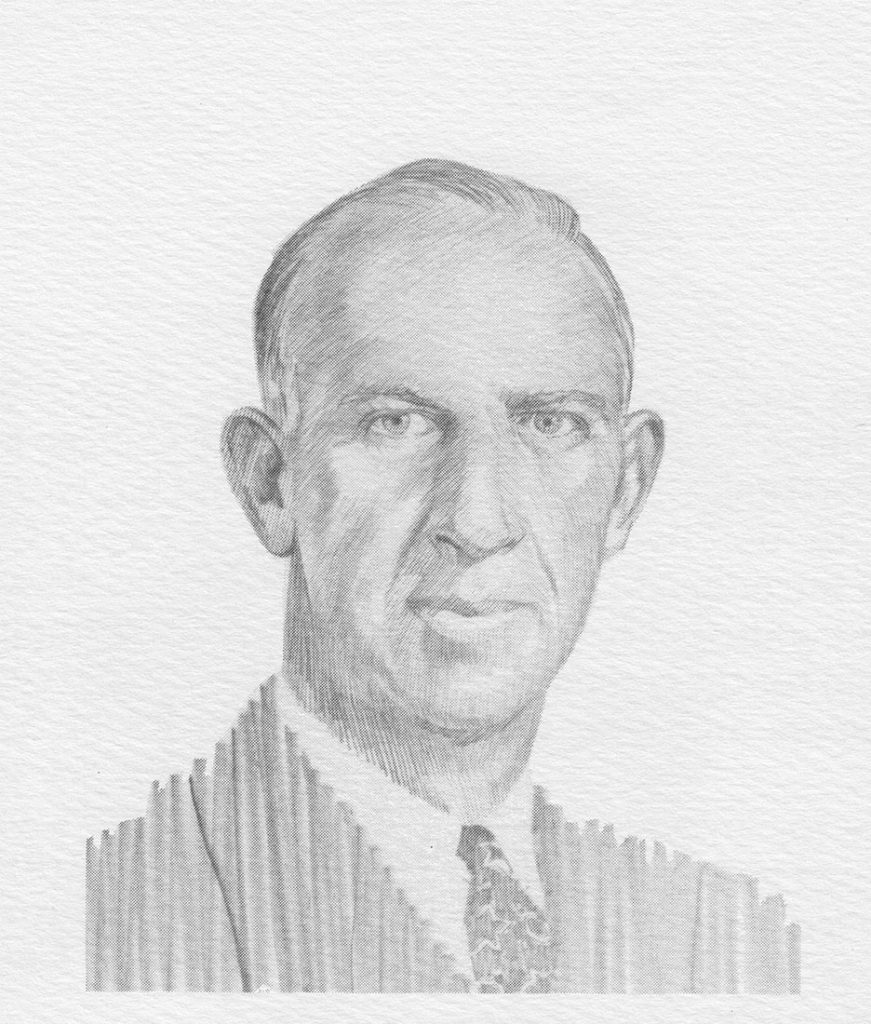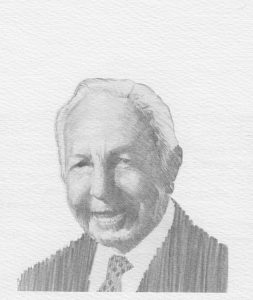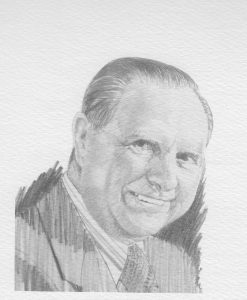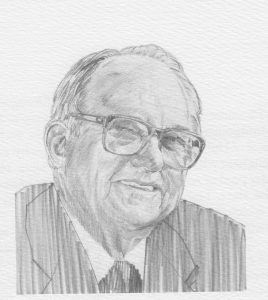William McWane, who retired in 975 as Chairman of the Board of McWane Cast Iron Pipe Company (now McWane, Inc.) of Birmingham, Alabama, was born in 1898 in Wytheville, Virginia. In 1904, when he was six, the family moved to Birmingham where his father became president of the Birmingham Steel and Iron Company.
This only son of James Ransom and Ella Mae McCartney McWane graduated from Powell High School in Birmingham and then earned a degree in engineering from Massachusetts Institute of Technology (MIT).
William McWane then followed in the footsteps of his grandfather and father by entering the foundry industry.
His grandfather, Charles Phillip McWane, had initiated the family’s involvement in the foundry business when he formed the C. P. McWane Foundry in Wytheville, Virginia, to produce plows and other farm equipment. (As a boy, C. P. McWane had spent many days around the blacksmith shop where his father James had worked with Cyrus McCormick in visualizing and manufacturing the world’s first successful reaper.)
After gaining experience in the foundry in Wytheville, William’s father with Henry and Authur McWane entered business for themselves in Lynchburg, Virginia, where they established the Lynchburg Foundry.
Then, in 1904, James R. McWane moved his family to the booming young city of Birmingham where he served as president of Birmingham Steel and Iron Company for four years.
A memento of that company still stands high above Birmingham on Red Mountain – the giant statue of Vulcan, which was originally cast for the St. Louis World’s Fair. Young William McWane watched as his father personally supervised the casting of this world-renowned symbol of the Birmingham steel industry-Vulcan, the god of the forge. His father was also one of the largest contributors to the Vulcan Fund established by the Commercial Club. But, it is reported, the venture almost cost William’s father his career because he was not paid for his services in casting the statue.
William’s father James joined the American Cast Iron Pipe Company (ACIPCO) in 1908. He served as president of ACIPCO from 1915 to 1921, when he resigned to establish in 1922, the McWane Cast Iron and Pipe Company. Four years later, the company expanded with the creation of Pacific States Cast Iron Pipe Company in Provo, Utah. The companies produced pipe, fittings, valves, and fire hydrants distributed nationwide.
In 1933, when James R. McWane died suddenly, thirty-five-year-old William McWane inherited the responsibility of running a company that, like many others at the time, was deeply in debt because of the Great Depression.
As President, William Mc Wane set out to ensure that the company would survive the Depression and become debt-free. His goals were achieved by the late 1930′ s and the company had begun to achieve greater prosperity by the early 1940’s.
In 1945, William McWane became Chairman of the Board of McWane Cast Iron and Pipe Company, in which capacity he served until 1975.
During these years, the company began to expand. DeBardeleben Coal Company was one of the companies acquired. As Empire Coke Company, it is still an operating division of Mc Wane, Inc.
In 1975, ”Mr. Bill” (as many people who worked at the McWane and Pacific States cast iron companies called him) relinquished his title as Chairman of the Board to his son, James R. McWane, who had served as president since 1971. William McWane then served until his death in 1978 as Chairman of the Executive Committee of the family company which had been renamed McWane, Inc.
William McWane represents the third of the five generations of the McWane family to assume leadership as masters of the forge and foundry. Today, his son, James Ransom (the fourth generation) is chairman of the board of McWane, Inc., which has expanded into a thriving multi-division corporation with operations in seven states and Canada. William McWane’s grandson, C. Phillip McWane, continues the family tradition as Director and Vice President of McWane, Inc.
William McWane’s contributions to Birmingham and the surrounding area were many. But, being a very private man, he often did not take credit for his industrial, business, and civic activities. He seemed to eschew publicity, preferring to remain in the background.
His picture did appear in the Birmingham News in 1945 when he was elected a director of the Birmingham Trust and Savings Company, and the caption under the picture cited him as a man “prominently identified with industrial, business, and civic activities.”
And, in order to promote the creation of the Birmingham Symphony orchestra, he let it be known that he was one of its early benefactors and supporters.
He was also a sponsor and benefactor of the Speies Clinic which was dedicated to the study of nutrition; and he was one of the directors of the Eye Foundation-both projects providing many benefits to the citizens of the state.
Like his father, William Mc Wane was a devotee of the game of golf. He was involved not only in playing for the fun of playing but also as a member of the United States Golf Association and of its rules committee for a number of years.
Quietly, William McWane exerted a beneficial influence on the economic, civic, and cultural life of the city where he lived for seventy-four years.
Sources of biographical information: “The Birmingham District: An Industrial History and Guide,” Birmingham Historical Society, 1981; Birmingham News, November 14, 1945; Leah Rawls Atkins, The Valley and the Hills: An IIustrated History of Birmingham and Jefferson County, sponsored by BirminghamJefferson County Historical Society.




